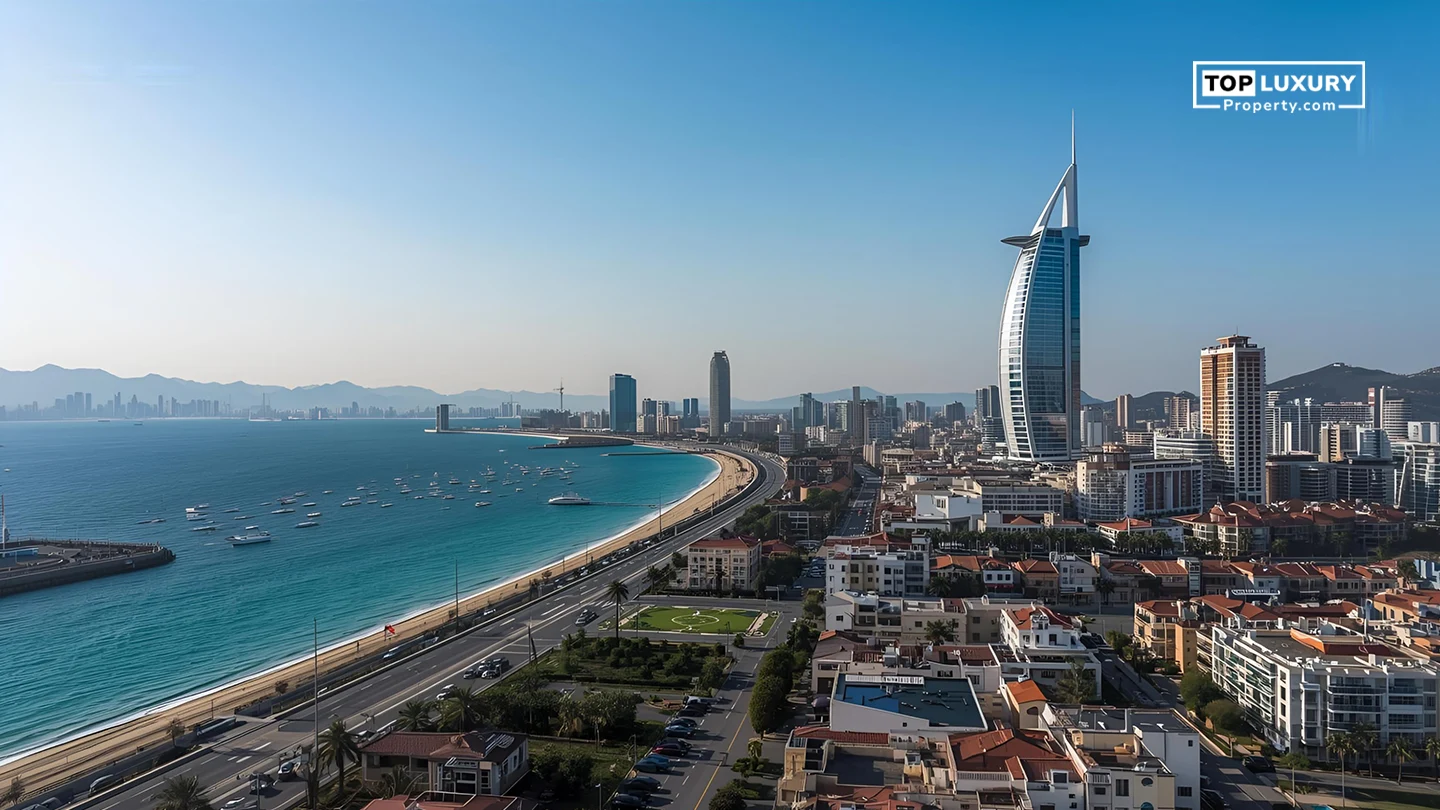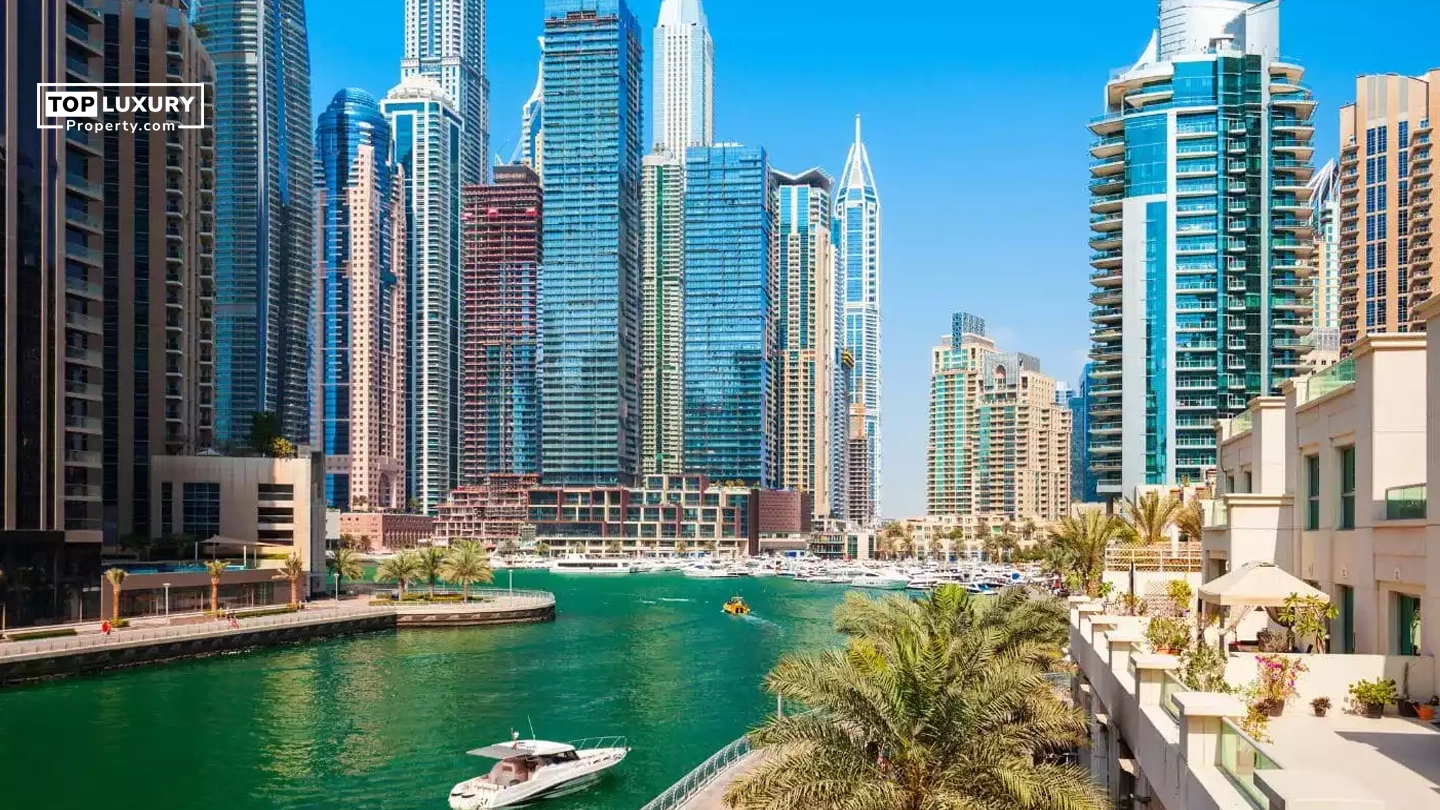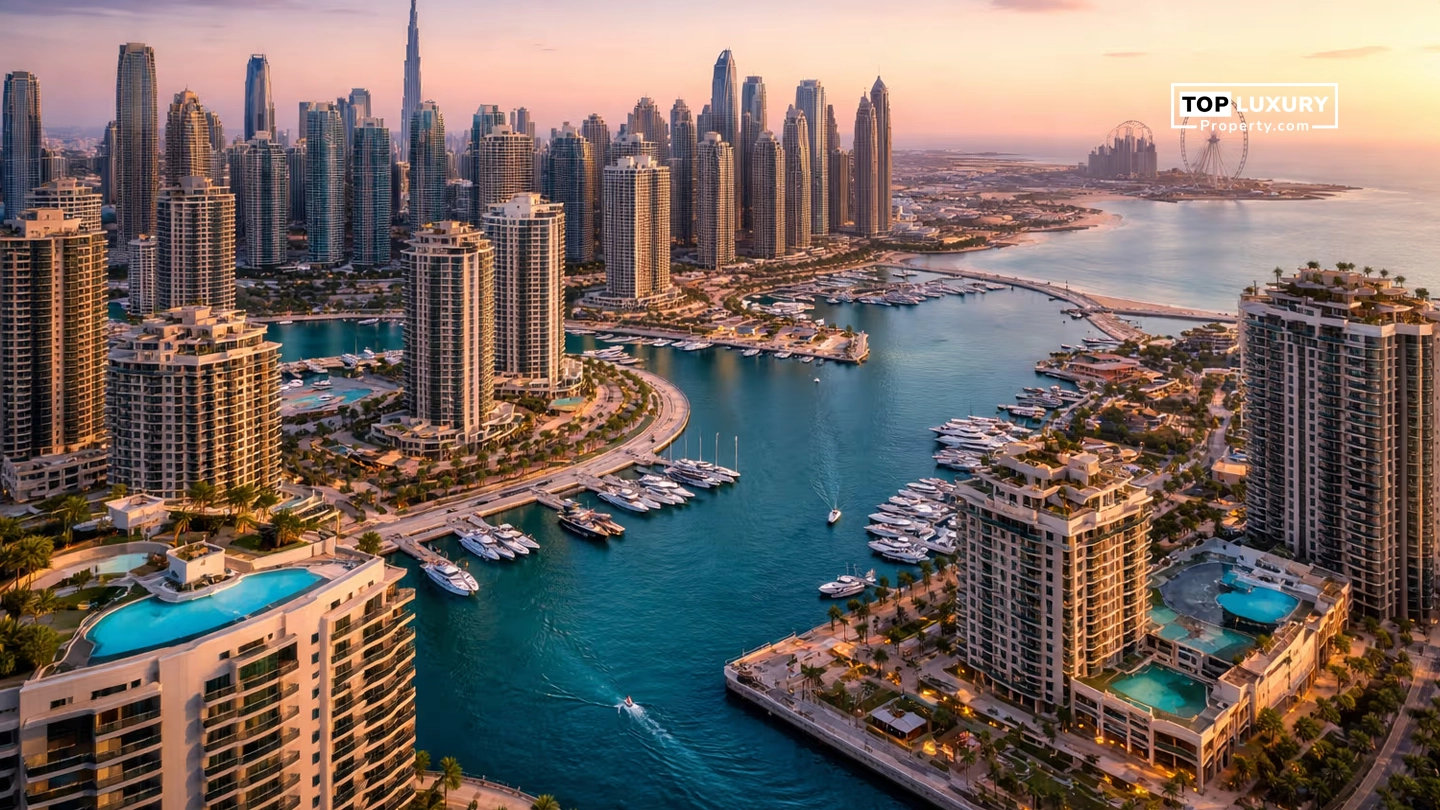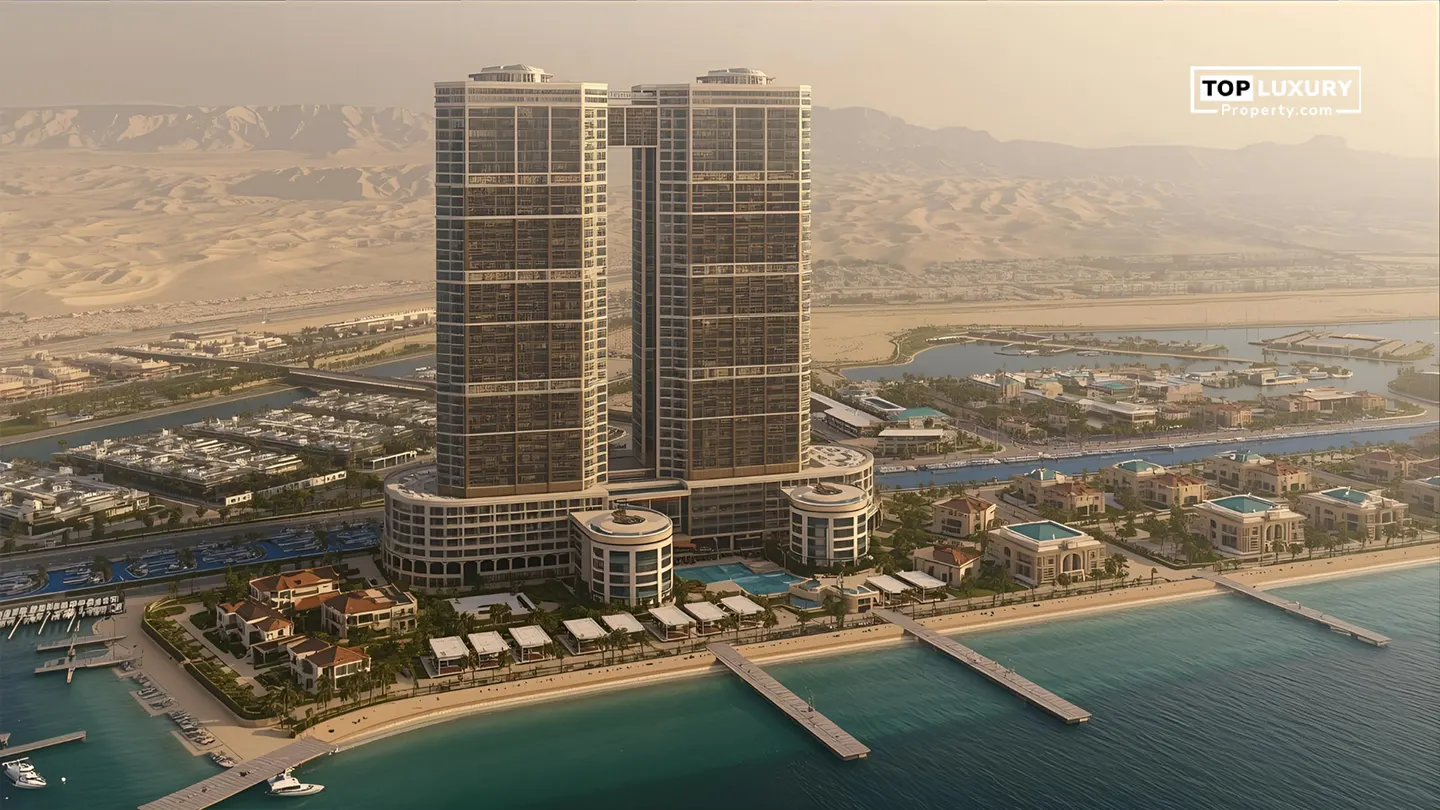Comparing investing in property in Turkiye vs Dubai
For Turkish nationals looking for property investment in Dubai, the choice between Dubai and Turkey is more than a real estate choice. With Turkish investors spending more than USD 2.5 billion on overseas property in 2024, Dubai is a hot spot for savvy buyers with its Dubai golden visa property benefits and high yields.
New data shows that Turkish citizens are seventh among foreigners investing in Dubai, having bought the property for 400% more in two years. And this surge signals an important change: Currency stability, high rental yields, and residency benefits that Dubai offers are increasingly important to Turkish investors compared to domestic options. This comparative landscape is essential to maximize your investment returns and to secure long term financial growth.
Market Trends and Growth Potential: Turkiye vs Dubai
Let’s see the market trends of both locations.
Dubai Market Trends
Dubai’s real estate market performed strongly in 2025, with transaction values jumping by 37.68% to AED 262.7 billion in the first half alone. The market closed 94,000 residential sales - up 23% from the previous year. This makes property investment in Dubai from Turkey particularly attractive, as average residential prices are now AED 1,720/square foot, almost double 2020 levels but still with appreciation potential.
Dubai’s apartment sales hit a record AED 93 billion in Q3 2025, with rental yields reaching 6-8% globally competitive returns. The emirate is targeting 76,000 new residential units by 2025, with another 200,000 by 2027, but population growth of 5.8 million by 2040 will ensure continued demand. About 70% of transactions are off-plan properties that Turkish investors can take out on flexible payment plans with a 10-15% appreciation on the handover.
Turkiye’s Market Dynamics
Turkiye’s property market experiences strong nominal growth with average housing prices increasing by 32.8% in July 2025. At 55,503 TRY per square meter (USD 1,520), Istanbul leads with USD 815-USD 1,112 per square meter. Home sales jumped by 56.6% in April 2025, reaching 118,359 transactions - solid domestic activity.
Yet adjusted for inflation, real estate appreciation in key cities like Ankara shows actual losses of 3.9% and in Izmir, 8.8%. Such inflationary pressure, along with Turkish Lira depreciation, creates currency risk for domestic investors who are foreign currency earners. Rental yields average 7.41% nationwide, with Istanbul at 6.21% and Ankara-Antalya at 7-9%.
In other words, Dubai has better price stability anchored by the dirham’s peg to the US dollar (only 3.6% variance over 15 years) than the Turkish Lira, which remains volatile. For property investment in Dubai from Turkey, this translates to stable currency returns.
Investment Costs and Rental Yields: A Side-by-Side Breakdown
Costs and rental yields affect the investment. If any market needs huge upfront costs or has too many extra charges, then investors are likely to keep their distance from there.
Initial Investment Requirements
Dubai’s property market entry points vary significantly by location and property type. Studios in mid-market communities like Jumeirah Village Circle (JVC) start at AED 450,000 ($122,500), while prime Downtown Dubai apartments begin at AED 1.5 million ($408,500). Villas in established areas like Arabian Ranches range from AED 3-10 million. Turkish investors typically allocate AED 0.8 - 1.2 million ($218,000-$327,000) for studios and one-bedrooms, and AED 1.5-3 million for larger units in Marina or Business Bay.
Turkiye offers considerably lower purchase prices. Properties in Istanbul start around $75,000 for residency qualification, with citizenship-qualifying properties requiring $400,000 minimum investment. Antalya properties begin at $900 per square meter compared to Dubai’s $465+ per square meter (AED 1,720). This 50-70% price differential makes Türkiye more accessible for smaller budgets.
Additional Costs and Fees
For property investment in Dubai from Turkey, buyers pay a 4% Dubai Land Department transfer fee and registration costs of AED 2,000-5,000. There are no annual property taxes - an advantage over many markets. For 3-4% mortgage interest, you need a 20-25% and 30-40% down payment for UAE residents and non-residents respectively.
Turkish property purchases involve a 4% title deed transfer tax (often split between buyer and seller), expert property valuation (USD 250), and Cadastral Administration fees (USD 70 for foreigners). Annual property taxes of 0.1-0.6% plus progressive rental income tax are among the rates available. Exchange requirements for currency (DAB certificate) add administrative complexity.
Rental Yields Comparison
Dubai delivers exceptional rental yields, with apartments averaging 7.12% and villas 4.92% as of September 2025. Top-performing areas include:
- Dubai Investment Park: 9.43% apartment yields
- Dubai Sports City: 8.24% yields
- Dubai Silicon Oasis: 8.15% yields
- Jumeirah Village Circle: 7.59% yields
- Business Bay: 6.81% yields
Prime villa communities like Damac Hills (5.57%) and Jumeirah Golf Estates (5.4%) offer lower but stable yields with strong capital appreciation potential. For Turkish investors earning rental income, Dubai’s tax-free environment means 100% of rental proceeds remain with the owner.
Turkiye’s rental yields average 7.41% nationally, with regional variations:
- Antalya: 7-9% yields (highest due to tourism)
- Istanbul: 6-8% yields (6.21% average)
- Ankara: 5-6% yields
- Izmir: 5-7% yields
While Türkiye’s nominal yields appear competitive, rental income is received in depreciating Turkish Lira, reducing real returns when converted to foreign currency. Additionally, vacancy rates tend to be higher in Türkiye, and rental income faces progressive taxation.
Legal Frameworks and Residency Perks for Turkish Nationals
Let’s compare the legal and residency perks of both markets.
Dubai’s Golden Visa Advantage
The UAE’s Dubai golden visa program gives Turkish nationals residency advantages through real estate investment. If they buy property worth AED 2 million (USD 545,000), investors get a renewable 10-year golden visa by investment with no minimum stay requirement. This visa includes:
- Family sponsorship: Family members can range from sons up to 25 to daughters of any age, and in some cases, parents.
- Business flexibility: Ability to start companies, open bank accounts and manage wealth without local sponsorship.
- No sponsor requirement: Property investors have independent residency status, unlike employment visas.
- Tax-free benefits: No individual personal income tax, capital gains tax, or property tax.
- Global mobility: Travelling freely while maintaining UAE residency.
Lower investment thresholds open up other options: AED 750,000 investment gets you a 2-year renewable visa or 3-year renewable residence permits tied to property ownership.
Turkiye’s Citizenship by Investment
Türkiye offers one of the world’s most straightforward citizenship programs. A $400,000 real estate investment grants Turkish citizenship within 3-6 months, with no residency requirements before application. Key features include:
- Minimum investment: $400,000 USD in single or multiple properties within same development
- Holding period: 3-year restriction on selling after citizenship approval
- Family inclusion: Spouse and dependent children under 18 (disabled children any age)
- Dual citizenship: Türkiye permits dual nationality, allowing investors to maintain other passports
- Travel privileges: Turkish passport provides visa-free access to 120+ countries, including EU Schengen area
Lower investment levels ($75,000) qualify for 2-year renewable residence permits, though without a citizenship pathway. Properties must be in government-designated areas, and all transactions require proper currency exchange documentation (DAB certificate).
For Turkish nationals, Dubai residency via property investment provides optimal tax planning while maintaining Turkish citizenship, whereas domestic Türkiye investment lacks comparable international residency benefits.
Risks, Stability and Lifestyle Factors
Risks Factors
While Dubai’s property market provides attractive yields, there are risks to consider for investors. The UBS Global Real Estate Bubble Index 2025 placed Dubai in “elevated risk” with 50% price growth over five years and rents rising before pay increases. Fundamental differences from 2008, though, are reassuring:
Population growth: Dubai’s population increased 15% since 2020 to 3.7 million, with estimates at 4.5 million in 2030, underpinning housing demand
Regulatory safeguards: RERA-held escrow accounts safeguard off-plan purchasers, and loan-to-value limitations (70-80%) avoid over-leveraging
Market diversification: As opposed to 2008’s high-end specialization, 2025 demand is diversified across mid-market segments such as JVC and Business Bay
Economic resilience: Dubai’s diversified economy beyond oil, with finance, tourism, and technology sectors, mitigates system risk
Despite this, Turkish property has particular risks that Turkish overseas investors would prefer to circumvent:
Currency volatility: Long-term Turkish Lira weakness eats into real returns, with nominal 32.8% price rise masking real dollar falls
Inflation pressure: 33% inflation spurs prices of property but reduces purchasing power and rental value income
Economic instability: Increasing unemployment (13%), political tensions, and monetary policy changes introduce uncertainty in investment
Market correction risk: Experts signal potential bubble in over-hyped segments, with corrections inevitable as interest rates return to normal
Economic and Political Stability Comparison
Dubai has a stable government, AA rating, and Vision 2030 pro-business strategy of economic diversification. Dirham US dollar peg provides currency stability unmatched in the emerging world. GDP per capita is USD 68,000 compared to Turkiye’s USD 27,000, reflecting higher economic prosperity.
On the other hand, Turkey is rated BB with a stable outlook, but political developments can be detrimental to economic performance. Position between Europe and Asia, NATO membership, and growing middle class give in favor of long-term potential, though short-term risk is high.
For Turkish investors, Dubai presents more stability statistics due to less unemployment (2.45% versus 13%), political stability, and less opaque legal systems.
Lifestyle and Quality of Life
| Feature | Dubai | Türkiye |
|---|---|---|
| Lifestyle Benefits | Tax-free income, world-class infrastructure, safety, multicultural environment, premium amenities, year-round sunshine. | Affordability, rich culture, accessibility (lower transportation, food, and entertainment costs), European influence. |
| Cost of Living | 7th most expensive city globally. Monthly rent for 1-bedroom: $2,200-$3,300. Annual international school fees: AED 80,000. Total monthly for expat families: $3,000-$8,000. | 26% lower than Dubai. Monthly rent for 1-bedroom in Istanbul: $615-$1,470. |
| Challenges | Extreme summer heat (managed via air conditioning). | High inflation, political/economic uncertainties, growing cost pressures in major cities. |
For Turkish nationals, Dubai offers superior earning potential and infrastructure despite higher costs, while Türkiye provides cultural familiarity and affordability at the expense of economic stability. Rent prices in Dubai are 172.4% higher than Istanbul, yet 87.8% purchasing power, versus Türkiye’s 32.9% reflects earning differentials.
Strategic Recommendations: Where Should Turkish Investors Allocate?
For Turkish investors seeking optimal property investment in Dubai from Turkey outcomes, a strategic allocation approach balances risk, returns, and residency objectives:
Prioritize Dubai for investors seeking:
- Capital preservation in stable currency (US dollar-pegged dirham)
- Tax optimization through zero income and property taxes
- Residency benefits via Dubai golden visa property pathway
- Superior rental yields (7-9% in mid-market segments)
- Global connectivity for business and lifestyle needs
Maintain selective Türkiye exposure for:
Citizenship acquisition through $400,000 minimum investment
Currency hedging if earning in Turkish Lira domestically
Tourism rental income in high-yield Antalya properties (7-9% yields)
Personal use vacation properties at affordable entry points
Investment Execution Best Practices
For Dubai investments:
Partner with licensed agents: Work with RERA-registered brokers and developers (Emaar, Nakheel, Damac)
Verify escrow compliance: Ensure off-plan projects use DLD-approved escrow accounts
Secure financing early: UAE banks offer 6.5-8% mortgages; arrange pre-approval before property selection
Plan residency timeline: Submit Golden Visa application immediately after title deed registration for fastest processing
Consider property management: Engage professional managers for 8-12% fees to maximize occupancy
For Türkiye investments:
Conduct thorough due diligence: Verify property titles, military zone restrictions, and developer reputation
Engage legal counsel: Ensure proper valuation reports, DAB currency certificates, and citizenship qualification
Budget for holding period: Plan for 3-year restriction on citizenship properties
Monitor currency timing: Leverage Lira weakness for favorable USD/EUR conversion when purchasing







